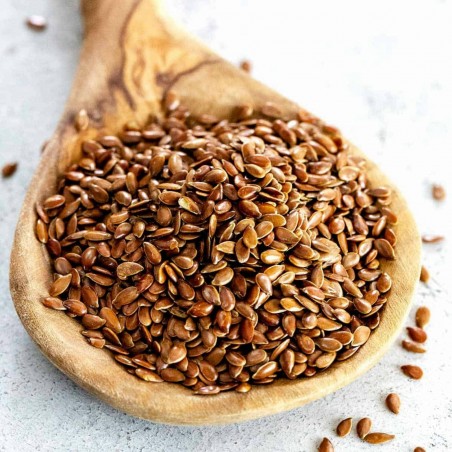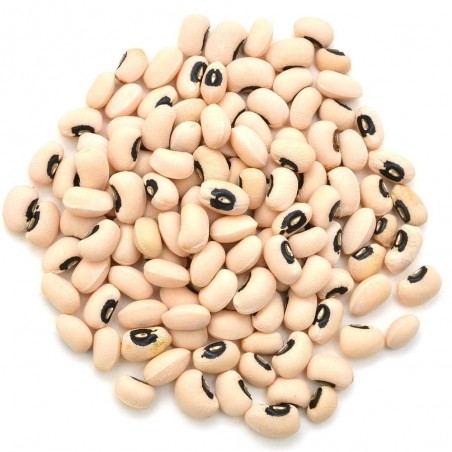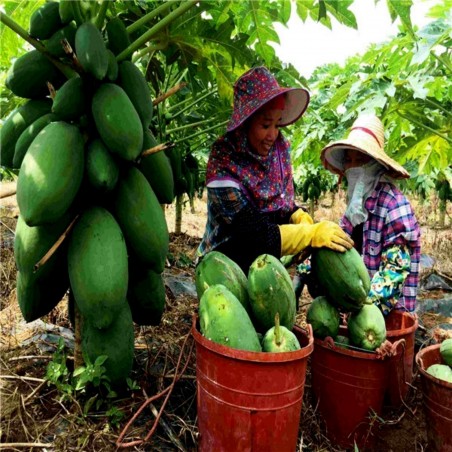
Spice Flax medicinal and healthy
Flax medicinal and healthy
The price is for packaging of 10 grams of this spice.
Flax (Linum usitatissimum), also known as common flax or linseed, is a member of the genus Linum in the family Linaceae. It is a food and fiber crop cultivated in cooler regions of the world. The textiles made from flax are known in the Western countries
Flax medicinal and healthy
The price is for packaging of 10 grams of this spice.
Flax (Linum usitatissimum), also known as common flax or linseed, is a member of the genus Linum in the family Linaceae. It is a food and fiber crop cultivated in cooler regions of the world. The textiles made from flax are known in the Western countries as linen, and traditionally used for bed sheets, underclothes, and table linen. The oil is known as linseed oil. In addition to referring to the plant itself, the word "flax" may refer to the unspun fibers of the flax plant. The plant species is known only as a cultivated plant, and appears to have been domesticated just once from the wild species Linum bienne, called pale flax.
Several other species in the genus Linum are similar in appearance to L. usitatissimum, cultivated flax, including some that have similar blue flowers, and others with white, yellow, or red flowers. Some of these are perennial plants, unlike L. usitatissimum, which is an annual plant.
Cultivated flax plants grow to 1.2 m (3 ft 11 in) tall, with slender stems. The leaves are glaucous green, slender lanceolate, 20–40 mm long, and 3 mm broad.
The flowers are pure pale blue, 15–25 mm in diameter, with five petals. The fruit is a round, dry capsule 5–9 mm in diameter, containing several glossy brown seeds shaped like an apple pip, 4–7 mm long.
Flax is grown for its seeds, which can be ground into a meal or turned into linseed oil, a product used as a nutritional supplement and as an ingredient in many wood-finishing products. Flax is also grown as an ornamental plant in gardens. Moreover, flax fibers are used to make linen. The Latin name of the species, usitatissimum, means "most useful".
Flax fibers taken from the stem of the plant are two to three times as strong as cotton fibers. Additionally, flax fibers are naturally smooth and straight. Europe and North America both depended on flax for plant-based cloth until the 19th century, when cotton overtook flax as the most common plant for making rag-based paper. Flax is grown on the Canadian prairies for linseed oil, which is used as a drying oil in paints and varnishes and in products such as linoleumand printing inks.
Linseed meal, the byproduct of producing linseed oil from flax seeds, is used to feed livestock. It is a protein-rich feed for ruminants, rabbits, and fish.
A 100-gram portion of ground flaxseed supplies about 534 calories (2,230 kJ), 41 g of fat, 28 g of fiber, and 20 g of protein.
Flaxseed sprouts are edible and have a slightly spicy flavor profile. Excessive consumption of flaxseeds with inadequate amounts of water may cause bowel obstruction. In northern India, flaxseed, called tisi or alsi, is traditionally roasted, powdered, and eaten with boiled rice, a little water, and a little salt. In India, linseed oil is known as alsi in Hindi and javas in Marathi. It is mainly used in Savji curries, such as mutton (goat meat) curries.
Whole flaxseeds are chemically stable, but ground flaxseed meal, because of oxidation, may go rancid when left exposed to air at room temperature in as little as one week. Refrigeration and storage in sealed containers will keep ground flaxseed meal for a longer period before it turns rancid. Under conditions similar to those found in commercial bakeries, trained sensory panelists could not detect differences between bread made with freshly ground flaxseed and bread made with flaxseed that had been milled four months earlier and stored at room temperature. This shows, if packed immediately without exposure to air and light, milled flaxseed is stable against excessive oxidation when stored for nine months at room temperature, and under warehouse conditions, for 20 months at ambient temperatures.
Three natural phenolic glucosides—secoisolariciresinol diglucoside, p-coumaric acid glucoside, and ferulic acid glucoside—can be found in commercial breads containing flaxseed.
Flax fiber is extracted from the bast beneath the surface of the stem of the flax plant. Flax fiber is soft, lustrous, and flexible; bundles of fiber have the appearance of blonde hair, hence the description "flaxen" hair. It is stronger than cotton fiber, but less elastic. The best grades are used for fabrics such as damasks, lace, and sheeting. Coarser grades are used for the manufacturing of twine and rope, and historically, for canvas and webbing equipment. Flax fiber is a raw material used in the high-quality paper industry for the use of printed banknotes, laboratory paper (blotting and filter), rolling paper for cigarettes, and tea bags.
The use of flax fibers dates back tens of thousands of years; linen, a refined textile made from flax fibers, was worn widely by Sumerian priests more than 4,000 years ago. Industrial-scale flax fiber processing existed in antiquity. A Bronze Age factory dedicated to flax processing was discovered in Euonymeia.
Flax mills for spinning flaxen yarn were invented by John Kendrew and Thomas Porthouse of Darlington, England, in 1787. New methods of processing flax have led to renewed interest in the use of flax as an industrial fiber.
One study of research published between 1990 and 2008 showed that consuming flaxseed or its derivatives may reduce total and LDL-cholesterol in the blood, with greater benefits in women and those with high cholesterol.
A meta-analysis has shown that consumption of more than 30 g of flaxseed daily for more than 12 weeks reduced body weight, body mass index (BMI), and waist circumference for persons with a BMI greater than 27. Another meta-analysis has shown that consumption of flaxseed for more than 12 weeks produced small reductions in systolic blood pressureand diastolic blood pressure Flaxseed supplementation showed a small reduction in c-reactive protein (a marker of inflammation) only in persons with a BMI greater than 30.

Aprecierea ta pentru recenzie nu a putut fi trimisa
Reclama un comentariu
Raport trimis
Reclamatia tau nu a putut fi trimisa
Scrie-ti recenzia
Recenzia a fost trimisa
Recenzia ta nu a putut fi trimisa
🌍 Livrare Globală din UE
Expediem comenzi la nivel mondial din Uniunea Europeană prin poștă înregistrată cu confirmare de primire.
📦 Urmărirea coletului
Pentru a urmări coletul, autentifică-te în contul tău și accesează secțiunea Istoricul comenzilor > Detalii. Acolo vei găsi numărul de urmărire.
Urmărire internațională: 17Track
Pentru numere de tip RGxxxxxxHR: Posta.hr Tracking
🕒 Notă: Informațiile de urmărire devin disponibile după cel puțin 24 de ore de la expediere.
⚠️ Informații importante
Plata ramburs nu este disponibilă.
Verifică dosarul SPAM / Junk al e-mailului pentru a nu rata notificările.
Contactează-ne doar prin formularul de contact de pe site.
E-mailurile directe nu vor fi procesate.
📱 Număr de telefon obligatoriu
La plasarea comenzii, te rugăm să introduci numărul tău de telefon mobil cu prefixul internațional al țării.
Exemplu: +40 712 345 678
🚚 Condiții de livrare
Pentru coletele înregistrate, este necesară semnătura destinatarului.
Nu comanda dacă:
dorești ca pachetul să fie livrat într-o cutie poștală
nu vei fi acasă pentru a-l prelua
dorești ca pachetul să fie lăsat la un vecin (❌ acest lucru nu este posibil)
📬 Dacă oferi o adresă de tip cutie poștală și coletul se pierde, nu ai dreptul la ramburs.
↩️ Returnarea coletului și reexpediere
Dacă, din orice motiv, coletul este returnat către noi:
Vei fi responsabil pentru costul de retur de 2 €
Și pentru costul reexpedierii
⏱ Întârzieri și urmărire
Dacă urmărirea indică „la expeditor”, înseamnă că este în tranzit.
Contactează oficiul poștal local cu numărul de urmărire pentru informații actualizate.
Nu suntem serviciu poștal – nu putem urmări coletul în numele tău.
Nu ne asumăm responsabilitatea pentru timpii de livrare.
🔍 Putem începe o investigație doar după 30 de zile de la data expedierii.
✈️ Opțiuni de livrare
| Tip livrare | Timp procesare | Asigurare | Posibile întârzieri | Detalii |
|---|---|---|---|---|
| Standard | 7–10 zile lucrătoare | ❌ | 7–14 zile | Cea mai ieftină opțiune |
| Prioritară | 1–7 zile lucrătoare | ❌ | 3–10 zile | Comanda procesată prioritar, dar nu livrată mai rapid |
| Asigurată | 1–7 zile lucrătoare | ✅ | 3–10 zile | Rambursare garantată dacă coletul se pierde (până la 150 €) |
🕒 Timp estimativ de livrare:
În UE: 3–20 zile lucrătoare
Internațional: 5–30 zile lucrătoare
Exemple livrări SUA: 27, 22, 19, 17, 13 zile
💳 Metode de plată
💶 Transfer bancar (SEPA / IBAN / SWIFT-BIC)
În descrierea plății trebuie să menționezi codul comenzii (ex. SGS-19811702).
Dacă nu apare codul, comanda poate întârzia sau fi anulată.
Dacă plata nu este recepționată în 7 zile, comanda va fi anulată automat.
🅿️ PayPal
Acceptăm plăți doar în euro.
Te rugăm să selectezi euro în timpul procesului de plată.
💳 Card bancar
Plata se face pe site-ul nostru: Exotic Seeds Store
Acceptăm: Visa, MasterCard, American Express, Diners Club, Discover, JCB, UnionPay etc.
💡 Clientul suportă toate taxele de tranzacție.
Pentru procesare rapidă, trimite dovada plății.
📅 Observații suplimentare
Nu procesăm comenzi și nu expediem sâmbăta sau duminica.
Verifică întotdeauna anunțurile importante de pe site-ul nostru înainte de a plasa o comandă (ex. sărbători sau condiții speciale).
📫 Important:
Nu trimite mesaje pe adresa noastră de e-mail. Folosește exclusiv formularul de contact disponibil pe site-ul nostru.
Related Products









